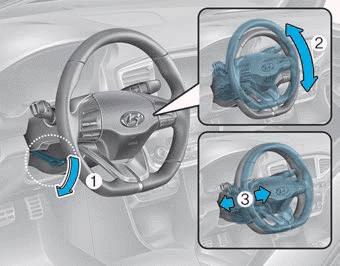Hyundai Ioniq: What to do in an emergency / Tire Pressure Monitoring System (TPMS)
Hyundai Ioniq (AE) 2017-2025 Owner's Manual / What to do in an emergency / Tire Pressure Monitoring System (TPMS)

(1) Low Tire Pressure / TPMS Malfunction Indicator Lamp
(2) Low Tire Pressure / Tire Pressure Monitor / TPMS Malfunction Display (shown on the cluster LCD display)
- Check Tire Pressure
- Tire Pressure Monitoring System
- Low Tire Pressure Telltale
- TPMS Malfunction Indicator
- Changing a Tire with TPMS
 If the Engine Overheats
If the Engine Overheats
If your engine coolant temperature gauge indicates overheating, you experience
a loss of power, or hear loud pinging or knocking, the engine may be overheating...
 Check Tire Pressure
Check Tire Pressure
You can check the tire pressure in the Information Mode (for cluster type
A) or Assist Mode (for cluster type B) on the cluster. Refer to the "LCD Display
Modes" in chapter 3...
Other information:
Hyundai Ioniq (AE) 2017-2025 Service Manual: Exhaust Gas Temperature Sensor (EGTS). Repair procedures
Inspection1.Turn ignition switch OFF.2.Disconnect the connector of exhaust gas temperature sensors #1/#2.3.Measure resistance between sensor signal terminal and ground terminal.4.Check that the resistance is within the specification.Exhaust Gas Temperature Sensor [EGTS #1, #2 (T3, T4)] Temperature [°C (°F)] Resistance (kΩ) -40 (-40)0...
Hyundai Ioniq (AE) 2017-2025 Service Manual: Brake Pedal. Repair procedures
Removal1.Turn ignition switch OFF and disconnect the negative (-) battery cable.2.Remove the crash pad lower panel. (Refer to Body - "Crash Pad")3.Remove the knee air bag.(Refer to Restraint - "Knee Airbag (KAB) Module")4.Disconnect the stop lamp switch connector (A) and the brake pedal stroke sensor connector (B)...
Categories
- Manuals Home
- 1st Generation Ioniq Owners Manual
- 1st Generation Ioniq Service Manual
- Coasting Guide (Plug-in hybrid vehicle)
- High Beam Assist (HBA)
- Checking the Coolant Level
- New on site
- Most important about car
Tilt Steering / Telescope Steering
Adjust the steering wheel so it points toward your chest, not toward your face. Make sure you can see the instrument cluster warning lights and gauges. After adjusting, push the steering wheel both up and down to be certain it is locked in position. Always adjust the position of the steering wheel before driving.
WARNING
NEVER adjust the steering wheel while driving. This may cause loss of vehicle control resulting in an accident.

Copyright © 2025 www.hioniqae.com
